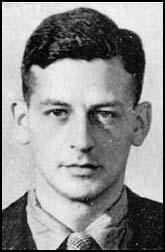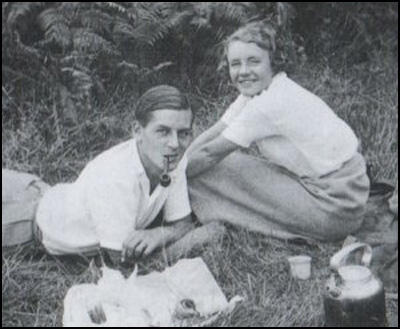Francis Suttill

Francis Suttill was born in Lille, Grance, in 1910. His father was British and his mother French. He was educated in Britain (Stonehurst College) and France (University of Lille).
Suttill worked as a barrister at Lincoln's Inn and on the outbreak of the Second World War he joined the British Army. Later he was recruited by the Special Operations Executive (SOE).
1942 the SOE decided to get Suttill to establish a new network called Prosper in and around Paris. On 24th September, 1942, Andrée Borrel was parachuted into France to prepare the way for Suttill who arrived on 1st October. A wireless operator, Gilbert Norman arrived in November and a second operator, Jack Agazarian, arrived the following month.
Suttill was impressed with Andrée Borrel and despite her young age in March 1943 became second in command of the network. He told the Special Operations Executive in London that she "has a perfect understanding of security and an imperturbable calmness."
On 22nd January 1943, Henri Déricourt, a former pilot in the French Air Force, arrived back in France. His main task was to find suitable landing grounds and organize receptions for agents brought by air. He worked mainly for the Prosper Network and over the next few months he arranged the transport by plane of over 67 agents.

Suttill and Jack Agazarian became increasing concerned about the loyalty of Henri Déricourt. In May 1943, Suttill returned to London and he passed on these fears to Nicholas Bodington and Maurice Buckmaster. However, they were unconvinced and refused to recall Déricourt to Britain.
On 12th June 1943, Suttill returned to France. On 23rd June, 1943, Suttill was arrested at the hotel he was staying at in the working-class district of Porte St. Denis. Andrée Borrel and Gilbert Norman were also arrested on the same day. When Noor Inayat Khan, who had just arrived as a wireless operator for Prosper, discovered that Suttill had been arrested, she reported back the disaster to the Special Operations Executive in London.
Suttill was taken to the Gestapo headquarters at 84 Avenue Foch. Suttill was tortured for several days and according to Ernest Vogt he eventually did a deal with the Germans. This included Suttill giving the Germans details of ammunition dumps in exchange for the promise that the people guarding them would not be killed. However, according to another German agent, Joseph Kieffer, it was Gilbert Norman who gave the Gestapo this information.
Some historians have questioned the truth of these allegations believing that Vogt and Kieffer were protecting the identity of the double agent, possibly Henri Déricourt, who gave them the information. Francis Suttill was executed on 21st March 1945.
Primary Sources
(1) Francine Agazarin, was interviewed by Liane Jones for her book A Quiet Courage (1990).
Although in the same network, my husband and I were not working together; as a radio operator he worked alone and transmitted from different locations every day. I was only responsible to Prosper (Francis Suttill) whom we all called Francois . He liked to use me for special errands because, France being my native land, I could get away from difficulties easily enough, particularly when dealing with officialdom.
Francois was an outstanding leader, clear-headed, precise, confident. I liked working on his instructions, and I enjoyed the small challenges he was placing in front of me. For instance calling at town halls in various districts of Paris to exchange the network's expired ration cards (manufactured in London) for genuine new ones. Mainly I was delivering his messages to his helpers: in Paris, in villages, or isolated houses in the countryside. From time to time I was also delivering demolition material received from England. And once, with hand-grenades in my shopping bag, I travelled in a train so full that I had to stand against a German NCO. This odd situation was not new to me. I had already experienced it for the first time on the day of my arrival on French soil, when I had to travel by train from Poitiers to Paris. A very full train also. I sat on my small suitcase in the corridor, a uniformed German standing close against me. But, that first time, tied to my waist, under my clothes, was a wide black cloth belt containing bank-notes for Prosper, a number of blank identity cards and a number of ration cards; while tucked into the sleeves of my coat were crystals for Prosper's radio transmitters; the crystals had been skilfully secured to my sleeves by Vera Atkins herself, before my departure from Orchard Court. My .32 revolver and ammunition were in my suitcase. The ludicrousness of the situation somehow eliminated any thoughts of danger.
In any case, I believe none of us in the field ever gave one thought to danger. Germans were everywhere, especially in Paris; one absorbed the sight of them and went on with the job of living as ordinarily as possible and applying oneself to one's work.
Because I worked alone, the times I liked best were when we could be together, Prosper (Francis Suttill), Denise (Andrée Borrel), Archambaud (Gilbert Norman), Marcel (Jack Agazarin) and I, sitting round a table, while I was decoding radio messages from London; we were always hoping to read the exciting warning to stand by, which would have meant that the liberating invasion from England was imminent.
(2) M. R. D. Foot, SOE in France (1966)
It is said to be widely believed in France that Suttill's circuit was deliberately betrayed by the British to the Germans; even 'directly by wireless to the Avenue Foch'. An assertion as absurd as this last one calls to mind the Duke of Wellington's reply to the man who called him Captain Jones: 'Sir, if you can believe that, you can believe anything'. The Avenue Foch could only be reached by wireless by someone who knew the frequencies it used; it was the task of one of the British intelligence departments to hunt for these frequencies and, having found them, to watch the traffic on them. It is not seriously conceivable that any transmission could have been made to the Gestapo direct from any British-held set without giving rise to widespread and elaborate inquiries involving several different secret services: how on earth could they all be hushed up ? Such a conspiracy to betray Prosper, whether per impossible by wireless or by any other means, appears in any case quite pointless. What object useful to British strategy could have been served by it ?
(3) Jean Overton Fuller, open letter to the makes of Churchill's Secret Army, broadcast in January/February 2000.
Ernest Vogt, through whom Kieffer (unable to speak either English or French) had conducted the interrogation of Prosper, had told me he was brought in shortly after midnight 24 June 1943; Kieffer had said what was important to him was to get in the dumps of arms and munitions before they were used to kill German soldiers; If Prosper would disclose the locations of all the dumps, neither he nor any of the agents guarding them would be executed; they would be held in prisons until the end of the war. Prosper asked what authority Kieffer had to promise that; Kieffer sent to the Reichssicherheitshauptamt, Berlin, and the authority arrived by breakfast time. Archambaud was then brought in and acquainted with the pact that had been made. Prosper wrote a note to Darling telling him to hand over the arms "to bearer", but when he had done so he was arrested.
Prosper now disappeared from the scene (Vogt did not know where he was taken to) and Archambaud left to explain the pact to further prisoners as they were brought in and to advise them to fall in with its terms, and some supposed him to be the author of it. So long as the Germans remained in Paris, the prisoners were kept in Fresnes or other prisons round about, but after the Allied landings, the Germans, in their retreat, did not leave them to the liberated by the Allies - they would have given away the radio game still being played by the Germans in their retreat. Probably because, as in their retreat they were constantly moving from one town to another which would have made in inconvenient to take a large number of prisoners, Kieffer must have been looking for some place where he could deposit them, and thereby lost the control of them, and (this he learned only from his Allied captors after the war) they got deposited in concentration camps, Buchenwald and others, where the guarantee that had been given of their being kept alive and well treated was ignored, or perhaps even not known about, and in the last stages of the war they were all murdered.

